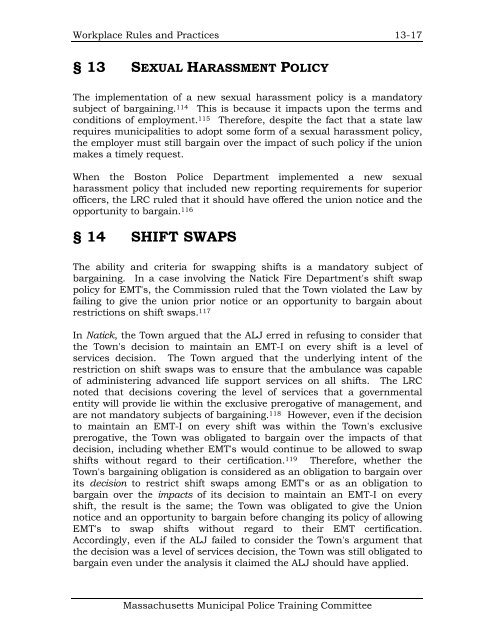Management Rights - AELE's Home Page
Management Rights - AELE's Home Page
Management Rights - AELE's Home Page
Create successful ePaper yourself
Turn your PDF publications into a flip-book with our unique Google optimized e-Paper software.
Workplace Rules and Practices 13-17<br />
§ 13 SEXUAL HARASSMENT POLICY<br />
The implementation of a new sexual harassment policy is a mandatory<br />
subject of bargaining. 114 This is because it impacts upon the terms and<br />
conditions of employment. 115 Therefore, despite the fact that a state law<br />
requires municipalities to adopt some form of a sexual harassment policy,<br />
the employer must still bargain over the impact of such policy if the union<br />
makes a timely request.<br />
When the Boston Police Department implemented a new sexual<br />
harassment policy that included new reporting requirements for superior<br />
officers, the LRC ruled that it should have offered the union notice and the<br />
opportunity to bargain. 116<br />
§ 14 SHIFT SWAPS<br />
The ability and criteria for swapping shifts is a mandatory subject of<br />
bargaining. In a case involving the Natick Fire Department's shift swap<br />
policy for EMT's, the Commission ruled that the Town violated the Law by<br />
failing to give the union prior notice or an opportunity to bargain about<br />
restrictions on shift swaps. 117<br />
In Natick, the Town argued that the ALJ erred in refusing to consider that<br />
the Town's decision to maintain an EMT-I on every shift is a level of<br />
services decision. The Town argued that the underlying intent of the<br />
restriction on shift swaps was to ensure that the ambulance was capable<br />
of administering advanced life support services on all shifts. The LRC<br />
noted that decisions covering the level of services that a governmental<br />
entity will provide lie within the exclusive prerogative of management, and<br />
are not mandatory subjects of bargaining. 118 However, even if the decision<br />
to maintain an EMT-I on every shift was within the Town's exclusive<br />
prerogative, the Town was obligated to bargain over the impacts of that<br />
decision, including whether EMT's would continue to be allowed to swap<br />
shifts without regard to their certification. 119 Therefore, whether the<br />
Town's bargaining obligation is considered as an obligation to bargain over<br />
its decision to restrict shift swaps among EMT's or as an obligation to<br />
bargain over the impacts of its decision to maintain an EMT-I on every<br />
shift, the result is the same; the Town was obligated to give the Union<br />
notice and an opportunity to bargain before changing its policy of allowing<br />
EMT's to swap shifts without regard to their EMT certification.<br />
Accordingly, even if the ALJ failed to consider the Town's argument that<br />
the decision was a level of services decision, the Town was still obligated to<br />
bargain even under the analysis it claimed the ALJ should have applied.<br />
Massachusetts Municipal Police Training Committee
















